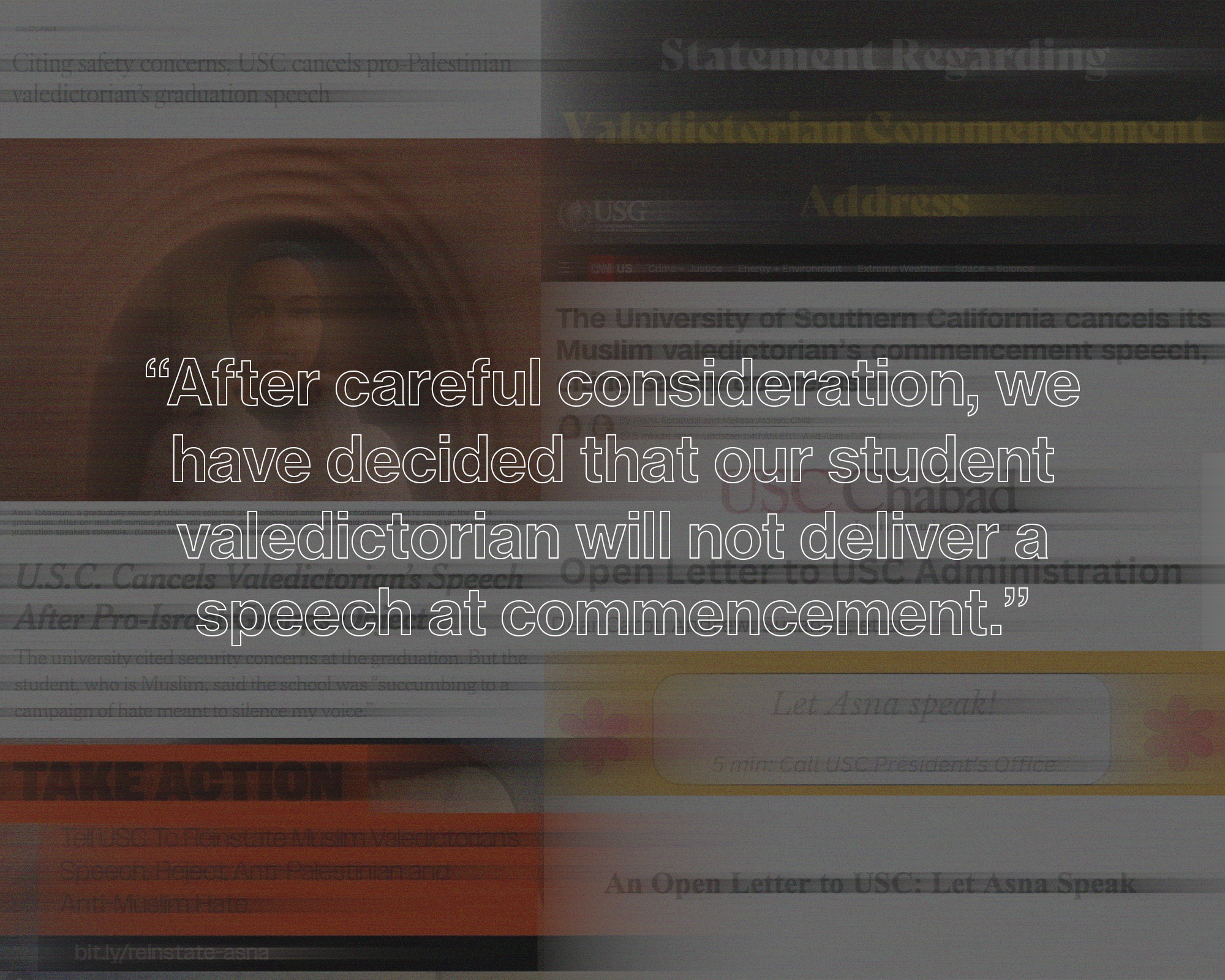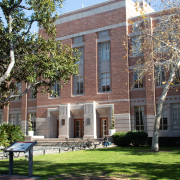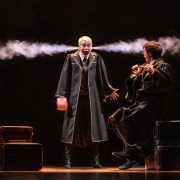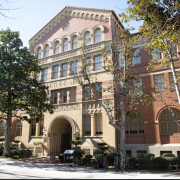Aftershocks ring in wake of USC valedictorian speech decision
Several statements, local and national headlines, and tens of thousands of petition signatures later, a picture of general anger and frustration emerges.
By JONATHAN PARK
USC’s unprecedented decision Monday to cancel its Class of 2024 valedictorian’s speech is still reverberating two days after the fact. Asna Tabassum has made national headlines and appeared as a guest on CNN and CBS News. Statement after statement has criticized the decision in one way or another. A petition to reinstate Tabassum’s speech has garnered 38,000 signatures in 48 hours. And, after the University at first vaguely attributed the decision to USC leadership, a new statement clarified that President Carol Folt had the final say.
Daily headlines, sent straight to your inbox.
Subscribe to our newsletter to keep up with the latest at and around USC.
A barrage of statements
The Undergraduate Student Government’s executive cabinet wrote, in a statement released Tuesday, that it shared “the sentiments of many of our fellow students who have felt disappointed by the University’s decision,” and that cabinet members “have relayed [their] concerns” to campus administration but have yet to receive a response.
“The reasoning as it stands is insufficient and ambiguous,” the statement read.
Trojans for Palestine, alongside 65 other student and local organizations, penned a letter to the editor published Tuesday, demanding Tabassum’s speech be reinstated and arguing that USC “perpetuates and engages in Islamophobia and xenophobia by bowing to anonymous, violent harassment campaigns that aim to harm people’s lives.”
“We would like to make this very clear: When you are silencing her, you are silencing all of us,” the letter read.
A different open letter, with some overlap in the 44 organizations that signed it, pointed out that USC has “a long history of hosting controversial speakers and famous leaders, indicating its confidence in its security protocol.” But in Tabassum’s case, USC forwent other alternatives — such as a pre-recorded speech or a written speech to be delivered by a faculty member — and instead made “the choice to break a promise to Asna.”
Pro-Israel groups on campus which, from the beginning, were opposed to Tabassum’s selection, were no less vexed by the decision. Chabad at USC posted an “Open Letter to USC Administration” on Tuesday from Rabbi Dov Wagner, who said that the University citing safety concerns “conveys the idea that the university supports the hate speech,” referring to the anti-Zionist content that the valedictorian engaged with on social media.
“I pray for wisdom and moral clarity on the part of our university’s leadership,” Wagner wrote. “I look forward to the day when USC actually lives up to its commitments to create an environment that is inclusive and welcoming to all.”
Trojans for Israel, in its own statement Tuesday, dared the University to “give her the platform to speak” if it “believes that the antisemitic vitriol promoted by the Valedictorian is representative of its values.”
USC Hillel expressed concern that the community is seeing “a surge of antisemitism and hate expressed on campus, in the classroom, and online,” and listed available resources for support.
Jewish professor stands in lone protest
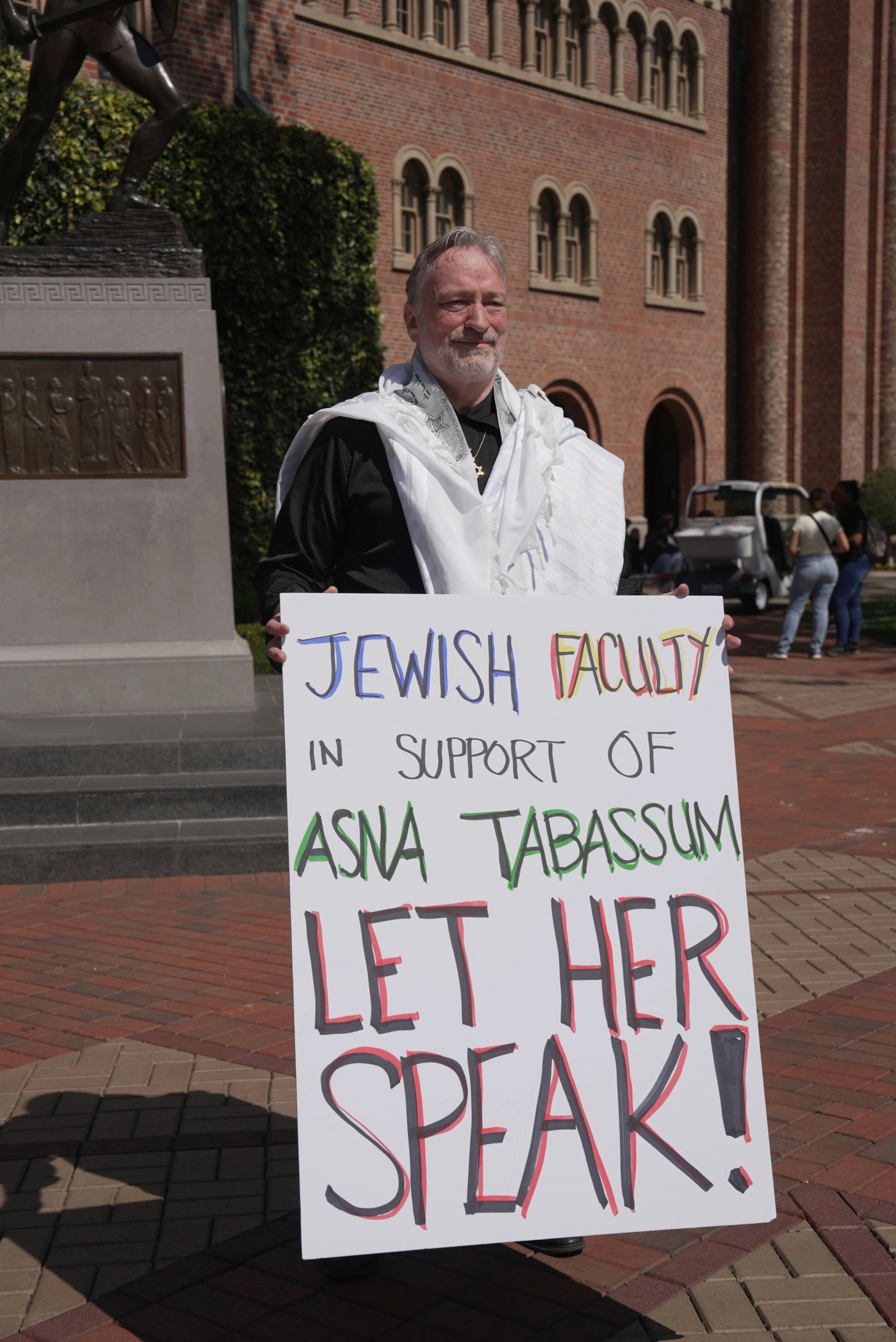
“They can’t make imperious decisions based on their own concepts of fear,” said Brent Blair, a professor of theatre practice in voice and movement. “We are the students and faculty. Let us be the bearers of what we think is and is not a safety issue.” (Henry Kofman / Daily Trojan)
Wednesday morning, Brent Blair stood guard at Tommy Trojan, donning a kippah and tallit — a religious Jewish head covering and prayer shawl, respectively — and a white poster board bearing the words: “JEWISH FACULTY IN SUPPORT OF ASNA TABASSUM / LET HER SPEAK!”
“It felt like my Jewish identity was somehow being presented as people against her,” said Blair, a professor of theatre practice in voice and movement. “I wanted her to know that there were Jews in support of her, who really felt like she should speak.”
Blair, who had been standing for 30 minutes before being interviewed, said he hoped his demonstration would help others “have a different idea of Jewish faculty, at least,” and that “faculty will stand together in solidarity and show this administration that we are bigger than them.”
“They can’t make imperious decisions based on their own concepts of fear,” Blair said. “We are the students and faculty. Let us be the bearers of what we think is and is not a safety issue.”
USC doubles down on “safety concerns” justification
In an interview with student media Tuesday afternoon, Associate Senior Vice President of Safety and Risk Assurance Erroll Southers differentiated the current case with other high-profile appearances, explicitly citing Barack Obama, Will Ferrell and the King of Jordan. Unlike them, Southers said, there was an “unprecedented number of people expressing grievances,” including some who threatened that “they were going to come to campus” should Tabassum deliver a speech.
Southers also sought to differentiate Tabassum with other controversial figures who were invited to speak on campus, such as Ben Shapiro in 2018 — before Southers’ time — and the Turkish ambassador to the United States last September. Both faced student protests and increased security presence.
“We look at the same risk formula for everything we do here, every single day, for almost every event,” Southers said. “All of them present different pictures, and all of them are very dynamic.”
Southers also disputed Tabassum’s account of their meeting on Sunday, in which the valedictorian quotes Southers as saying they were choosing not to implement increased security protections as that was “not what the University wants to ‘present as an image.’”
“We did not talk about image,” he said. “We only talked about safety.”
Senior Vice President of Communications Joel Curran wrote in a statement to the Daily Trojan on Wednesday that “whenever there is a question of safety and security of the campus, the president always makes the final decision.”
When asked if the administration had considered alternatives that still would allow Tabassum to speak before deciding on a complete cancellation, a University spokesperson pointed to Guzman’s initial announcement and declined to comment further. The same spokesperson also said the University had no further information when asked whether Tabassum would be present at the commencement ceremony and if that would not present the same sort of safety concerns cited in their decision to bar her from speaking.
Tens of thousands sign petition
A petition to reinstate Tabassum’s valedictorian speech has garnered more than 38,000 signatures, the Greater Los Angeles Area office of the Council on American-Islamic Relations announced in a press release Wednesday afternoon.
“The overwhelming response in support of Asna is truly inspiring,” said CAIR-LA Executive Director Hussam Ayloush in a statement. “Asna’s strength and courage are admirable, and we fully support her as she continues to speak out against injustice and stands up for human rights for all.”
The University had no comment regarding the petition.
Quinten Seghers contributed to this report.
DONATION PLUG – PLEASE DO NOT TOUCH
Thank you for reading the Daily Trojan.
We are the only independent newspaper here at USC, run at every level by students. That means we aren’t tied down by any other interests but those of readers like you: the students, faculty, staff and South Central residents that together make up the USC community.
Independence is a double-edged sword: We have a unique lens into the University’s actions and policies, and can hold powerful figures accountable when others cannot. But that also means our budget is severely limited. We’re already spread thin as we compensate the writers, photographers, artists, designers and editors whose incredible work you see in our daily paper; as we work to revamp and expand our digital presence, we now have additional staff making podcasts, videos, webpages, our first ever magazine and social media content, who are at risk of being unable to receive the support they deserve.
We are therefore indebted to readers like you, who, by supporting us, help keep our paper daily (we are the only remaining college paper on the West Coast that prints every single weekday), independent, free and widely accessible.
Please consider supporting us. Even $1 goes a long way in supporting our work; if you are able, you can also support us with monthly, or even annual, donations. Thank you.

